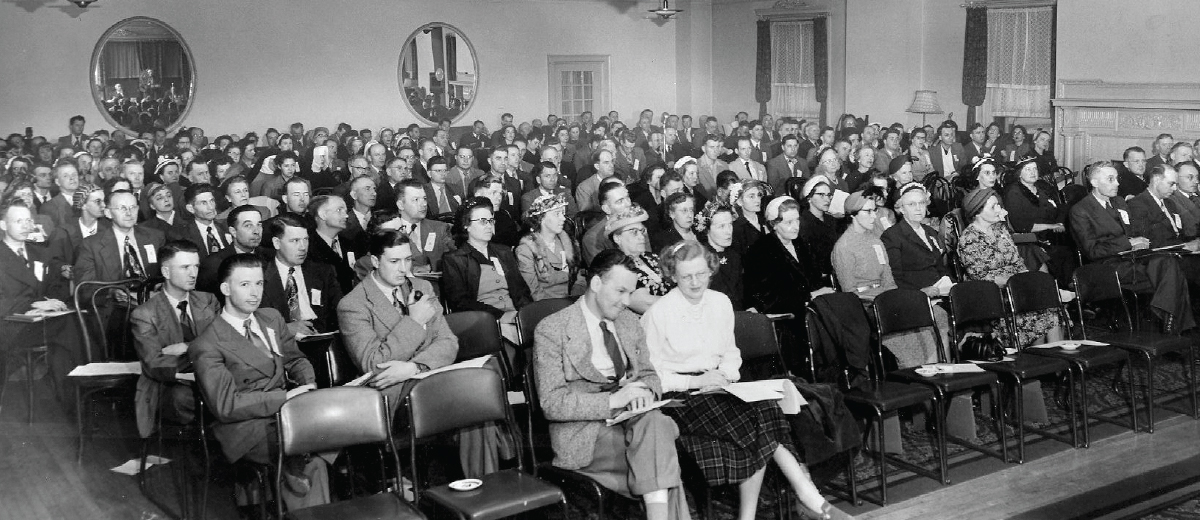100 Years of Service
If only W.E. Marsh could see us now: 16,000 strong after almost 100 years of fighting for teachers, students and public schools.
Marsh was the Belmont teacher who gathered 17 of his colleagues together in the basement gymnasium of the old Normal School on Winnipeg’s William Avenue to discuss forming a teachers’ organization.
It was hot July day in 1918. Marsh and his fellow teachers met over lunch hour to pool their resources and lay the foundation for what was to become the Manitoba Teachers’ Federation (MTF).
They recognized that teachers’ wages, along with those of other workers, were paltry. They also knew they were sowing the seeds for something bigger than themselves.
The following year, on April 22, 1919—at 7:30 p.m. to be precise—hundreds of Manitoba’s teachers poured into the concert hall of the Industrial Bureau at Main and Water Streets to organize themselves at their first general meeting.
Some outsiders viewed the group suspiciously. As A. J. Struthers recalled: “We were not concerned about the general public—anyway most people had shown themselves massively indifferent to our doings. But some businessmen, certainly some school trustees, regarded this movement as a revolutionary Bolshevik plot to bring on a general strike.…”
Officially Organized
Herbert Huntley was chosen as the Federation’s president and B. Stewart was elected vice-president. The MTF’s first big test came in 1922 when nearly 80 of Brandon’s public school teachers were dismissed for rejecting a 25 per cent salary cut. (See Remarkable Display below.)
As J. C. Wherrett, one of those teachers, noted, “We felt that by taking a stand we had perhaps saved others from such an ordeal.” The Federation’s lobbying didn’t recover the jobs, but the MTF did come to the members’ financial aid.
Slashed teachers’ salaries and indiscriminate firings followed during the Depression. Membership in the MTF fell dramatically during this period as teachers left the profession. However, in 1934, the MTF secured a new teachers’ contract which closed the trustees’ escape-hatch—the automatic lapsing of contracts.
Up to and during World War II, the MTF lobbied for larger school divisions to improve efficiency. In 1942, the MTF became The Manitoba Teachers’ Society (MTS) in recognition of its responsibility for teachers’ professionalism and ethical conduct.
In the 1950s, Manitoba teachers lost the right to strike. In return they gained binding arbitration, due process and a provincial certification board. Baby boomers strained Manitoba’s schools throughout the 1960s, and the Society continued its work towards the advancement of public school education.
The 1970s saw improvements in the teacher training and certification processes and the MTS tackled the issue of declining school enrollment. Education finance, teachers’ rights and mainstreaming were all burning issues during the 1980s.
New challenges such as underfunding, unequal access to programs for students, and government-imposed limits on teacher bargaining faced Manitoba teachers in the 1990s.
Close Monitoring
Of course, the 21st century has brought with it new opportunities and challenges. The Society’s 57 teacher associations have been trimmed to 39 as a result of school board amalgamations. Local associations have adapted well to the changes.
Cuts and freezes to public education are no longer a regular occurrence, but underfunding remains a problem. Restrictions on teacher bargaining have been lifted. But, as always, the Society is looking to the future to improve its members’ rights and working conditions.
The system of local bargaining teachers have been using for 47 years has served teachers within limits. But it has made for uneven results in the collective agreements of the Society’s 39 associations. Most provinces and territories have already moved to provincial bargaining.
In 2002, the Society’s Provincial Council set a mandate to negotiate one province-wide collective agreement for all public school teachers. Some definite possibilities lie within our reach through bargaining one agreement with the Province.
Naturally, this and every other issue which could potentially affect the working lives and professional status of our members, now and in years to come, is being closely monitored by the Society.
Since its inception just 23 days before The Winnipeg General Strike, The Manitoba Teachers’ Society has protected teachers’ rights and working conditions, advanced public education and fought for strong public schools.
It is the first and best defense for Manitoba’s public school teachers. It will continue to champion the cause of teaching and public schools throughout the 21st century.

